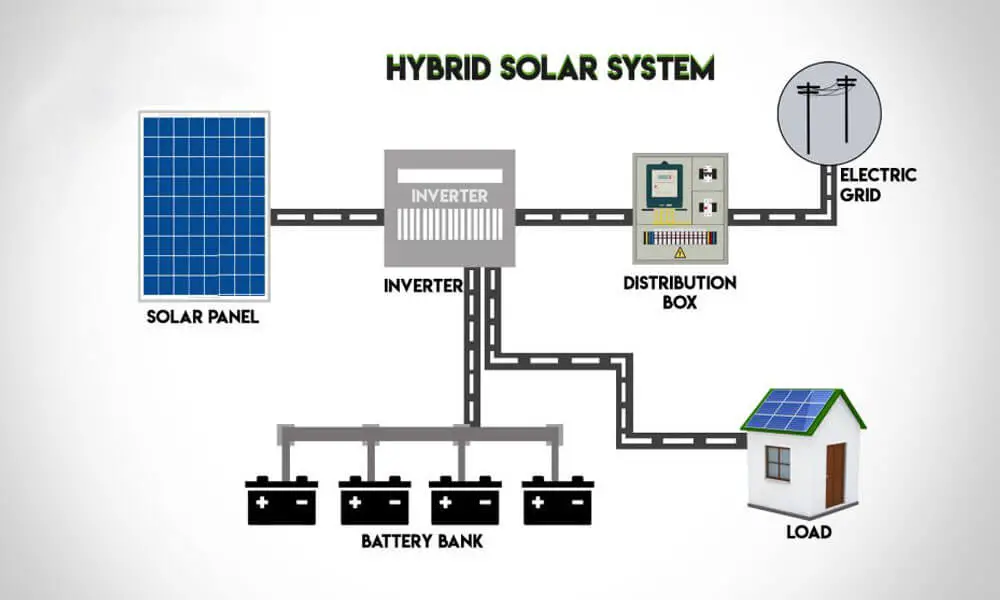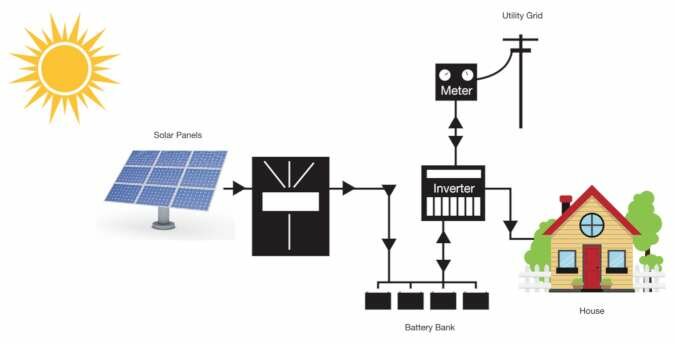
The world is moving towards a greener future. One of the key elements of this shift is the widespread adoption of renewable energy. Hybrid solar systems are a great innovation that allows homeowners to harness the free energy generated by the sun and use it to help supplement their homes’ electricity needs throughout the year. Hybrid solar systems are efficient, reliable and a great investment for homeowners looking for solar power.
In this article, we will introduce you to the relevant information about hybrid solar systems, so that you have a deep knowledge and understanding of hybrid solar systems to help you determine the best choice for your home energy needs!
What Is a Hybrid Solar System?
A hybrid solar system is a power generation system that integrates multiple solar energy conversion technologies. It is a solar power generation system using solar panels, hybrid inverters and battery packs. Solar panels convert sunlight into electricity, while batteries store energy for later use.
At the same time, hybrid solar systems can switch between on-grid and off-grid modes. With grid-connected and off-grid functions, you can continue to operate with solar energy even if the grid is out of power.
This system usually combines the two main forms of solar photovoltaic and solar thermal power generation.
Solar photovoltaic power generation: that is, the process of directly converting solar light energy into electricity. Photovoltaic power generation system is usually composed of solar panels, supports, DC circuit breakers, inverters, AC circuit breakers and electricity meters. The solar panels convert the sunlight they receive into direct current, which is then converted into alternating current by an inverter for daily use.
Solar thermal power generation: Typical applications for solar air conditioning and solar hot water supply. This is done by collecting solar heat, driving adsorption or absorption refrigeration equipment for cooling, or directly for the production of hot water.
The integrated use of solar photovoltaic and thermal power generation hybrid solar energy system can make use of sunlight as much as possible to generate electricity in a certain area, improving the efficiency of solar energy use.
Components of A Hybrid Solar System
Hybrid solar systems use many interacting components, and the components of a basic hybrid solar system include:
Solar panel: This is the core part of the system responsible for collecting solar radiation and converting it into electricity or heat through the photoelectric or thermoelectric effect. Hybrid solar systems use the same photovoltaic panels as conventional installations.
Dc bus box: A bus box is a device that brings together multiple DC currents from a solar panel to output a total current. This component of a hybrid solar system usually consists of multiple inputs and outputs, which need to be configured according to specific requirements.
Hybrid inverter: An inverter is a device that converts direct current to alternating current. This is a special type of inverter that is able to connect solar panels and battery storage systems. In a solar system, it receives direct current generated from solar panels and then converts it into alternating current that can be fed to the grid or used by household appliances.
Battery system: A battery is a component used to store additional electricity generated by a solar panel. Batteries in hybrid solar systems can provide backup power during power outages. It also allows you to use solar energy at any time, even if your PV modules are not generating electricity. Your installer may recommend lithium batteries over lead-acid batteries because of their superior efficiency and longer service life.
How Does a Hybrid Solar System Work?

A solar hybrid system is a renewable energy system that uses solar panels to generate clean energy to power your home. It all starts when solar panels are exposed to sunlight to collect energy. These panels are able to use solar energy to make special photovoltaic cells.
The energy obtained by converting solar energy into solar energy is stored in the form of direct current. Since most of our homes use alternating current, solar inverters are a necessary part of a hybrid energy system that converts raw direct current into alternating current available to us.
When your system generates more energy than your home currently uses, the extra energy is not wasted, but is sent to the battery in your home via the switchboard for storage. The battery will retain solar energy for as long as you need it. Most of the time, when the sun is setting or at night, solar energy cannot be generated, and this time you can obtain electricity from the battery to power your appliances.
It’s also helpful when the public grid goes down. When the sun’s energy is not available (such as at night), you can still rely on solar cells to meet your home’s electricity needs.
How Much Does a Hybrid Solar System Cost?
The cost of hybrid solar systems varies depending on their size and specific system configuration. By normal solar company standards, the average cost of a hybrid solar system is between $20,000 and $40,000. Costs may vary, however, depending on a number of factors, and this is just a guide.
However, it is important to note that the cost of installing a hybrid solar system includes not only the purchase of the equipment, but also subsequent costs such as installation, transportation and maintenance. In addition, due to geographical location, local policies and other factors, system prices may vary from place to place.

Advantages of Hybrid Solar Systems
Hybrid solar systems allow flexibility to manage time-of-use electricity bills to maximize savings on monthly solar bills. The advantages of hybrid solar systems are varied and practical. Here are some of the important benefits:
1. Cost effectiveness
Hybrid solar systems allow you to lock in low energy prices for years to come and protect you from future interest rate increases. It also allows you to manage time-of-use electricity bills to maximize savings on solar energy bills.
2. Reduce the risk of power failure
Hybrid solar systems are capable of providing power during grid outages. The main benefit of a hybrid solar system is that when the grid fails due to technical errors or adverse weather conditions, the system ensures that your property has power, even if the grid is unable to provide it.

3. Flexibility and scalability
The design of the hybrid system can be customized for different application scenarios, whether it is a small rooftop installation or a large-scale solar farm. At the same time, it has certain scalability and can be expanded according to future energy needs.
With flexible and scalable hybrid solar systems, we are able to use natural energy more efficiently, helping to drive the development of renewable energy.
4. Environmental sustainability
Hybrid solar systems have been praised for their high degree of environmental sustainability. Solar panels are growing in popularity as people look for ways to reduce their carbon footprint. Can reduce the carbon footprint, as well as have a stable and continuous power output, friendly to the environment. For those who want to do their bit for the environment, hybrid solar systems are a good option.
Disadvantages of Hybrid Solar Systems
Hybrid solar systems are an efficient use of renewable energy with many advantages. But it also has some challenges and drawbacks, and we need to understand the pros and cons of any renewable energy system to be able to make an informed decision.
The following are the main disadvantages of hybrid photovoltaic systems:
Space requirements: Hybrid photovoltaic systems with multiple solar cells require a lot of installation space.
Higher upfront investment: One of the main disadvantages of hybrid systems compared to traditional systems is the higher upfront cost. The additional cost is mainly due to the inclusion of battery storage and more complex system balance.
More complex installation and setup: Installing hybrid systems is more complex than standard off-grid or grid-connected systems. It is a combination of grid-connected and off-grid characteristics of solar power generation systems, often including battery energy storage systems. Not only can the use of high-voltage electricity be fatal, but grid connections may require inspections and permits.
More maintenance required: Compared to standalone systems, hybrid solar systems may require more maintenance due to their complexity. Monitoring and maintenance of the various components in the system may require more resources and time.
Is a Hybrid Solar System Right For Me?
Deciding whether a hybrid solar system is the best fit for your home can come down to assessing a few different key factors. These include your electricity needs, geographic and climatic conditions, installation space, grid conditions, your budget, and your overall personal preferences.
These days, hybrid energy systems are very popular with homeowners because they offer all the benefits of a grid-connected system, along with some of the benefits of an off-grid system.
This type of system can be especially useful if you live in a geographic location that experiences frequent power outages. That’s simply because the hybrid system will have battery storage and a backup power system to help keep your home running in the event of a public grid failure.
Conclusion
Hybrid solar systems are a good option for homeowners who not only want to use solar energy to lower their electricity bills, but also want to ensure that your property is powered during power outages.
If you are considering investing in a Solar system, choose GYCX Solar, from solar photovoltaic panels to solar inverters, we are committed to providing you with efficient and reliable solar solutions from start to finish. Contact us for a clean energy future!
Frequently Asked Questions
Are hybrid solar systems the same as off-grid solar systems?
No, hybrid solar systems are different from off-grid systems. While both can store energy, the hybrid system is still connected to the grid, providing backup power. The off-grid system is completely independent of the grid.
What is the difference between a solar system and a hybrid solar system?
Conventional solar systems, often referred to as grid-connected solar systems, connect directly to the grid and do not store any electricity. It only works when the sun shines. However, hybrid solar systems can store excess energy in batteries for use in times of insufficient sunlight or power outages.
Are off-grid or hybrid solar systems better?
Off-grid and hybrid solar systems each have their advantages. Choosing an off-grid solar system or a hybrid solar system depends on your individual needs and circumstances. Hybrid solar systems may be suitable for users in areas with unstable grid conditions or high electricity prices, or users with high electricity demand.
